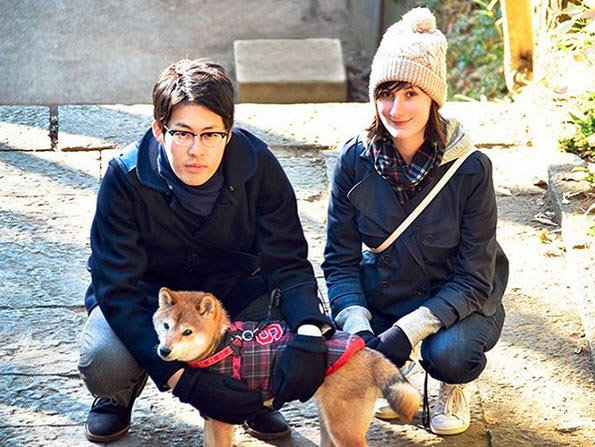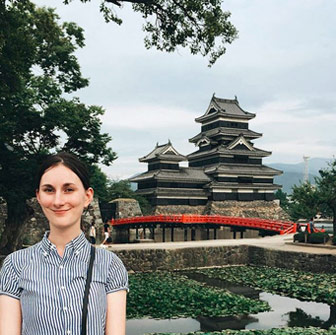It’s time again for the “My Japanese Life” series!
Today we have a fellow German expat who’s married to a Japanese citizen.
You might already know her as she also took part in the interviews for “All You Ever Wanted to Know About Dating Japanese Men“.

Today’s “My Japanese Life”:
How / why did you end up in Japan?
First, there was Pokémon. Then there were manga. Next came Japanese music and fashion. Through my teenage years I was a huge fan of Japan, and since I didn’t have any plans concerning what to do after graduating high school, I saved some money and got a Working Holiday visa – even though I had never been to Japan before.
Was it easy to come to Japan (visa / job)?
Lucky for me, I’m a German citizen, so getting a Working Holiday visa was rather easy. They didn’t really ask any hard questions, only wanted to know if I had enough money to survive (~2000 €), and just like that I had a fancy visa in my passport.
Unfortunately those 2000 € didn’t last me long, as I acted like a kid let loose in a toy store. I guess that’s what happens when you’ve finally arrived in the land of your dreams. Unfortunately, one cannot live on the high of living in Japan alone (not to mention that the high fades), and so I had to start looking for a job. At that time, there was an office helping Working Holiday visa holders to find work, and I found my first job through them – for a German restaurant. The pay was pretty bad (720 yen/h), but to be quite honest, I was inexperienced, didn’t speak much Japanese and probably was not worth much more. My second job during my Working Holiday year was cleaning rooms at a hotel, which had the advantages of higher pay (950 yen/h, I was basically rolling in money) and working on my own, without pesky people. Let’s be quite honest here: I barely managed to make a living. My room was around 60,000 yen in rent, eating up more than half of my monthly earnings. During the whole year the furthest I went for anything resembling a holiday was Nikko, and I only went there thanks to my husband’s parents’ kindness.
Apropos husband: If you read the header with all the information on me, you know that after my Working Holiday visa I got a spouse visa. If you fall in love with a Japanese person and want to get married, it’s by far the easiest way to get a visa that will last longer than a year. ;)
After being married for three years I applied for permanent residency and got that without much hassle.
As for my other jobs, I found them either through Hello Work (the Japanese employment bureau), friends or agencies. It was never ridiculously hard to find a job, the longest I was looking for one during my seven years here was two weeks.
What were the difficulties you had to struggle with at first?
Besides the fact that my Japanese was pretty horrid, my biggest struggle was not having any money. As I was also not able to cook anything at all, I survived on cheap meals from the 99 yen conbini around the corner. I am still surprised that I didn’t get scurvy.
The second time I moved to Japan was after getting married to my Japanese husband. This time around things were a lot easier, as I actually spoke the language quite well and had a stable income. Plus, the whole Japanese spouse and family thing was really helpful.
Did you struggle obtaining things one needs for daily life such as bank account, cellphone, credit card, driving permit?
When I first tried opening a bank account, I was told that to be able to do that I had to have stayed in Japan for X amount of years and an inkan (name stamp) was required. I knew that was a lie, but I wasn’t able to defend myself. The very next day I went to another branch of the same bank to get a bank account, and suddenly there was no problem anymore. I’m still using that bank account, and while in 2008/09 I was still too young to get a credit card, I now have two. ;)
I made getting my hands on a cellphone hard for myself, though that was my own stupidity. Back in the day, you didn’t get your residence card (it was called the “Alien Identification Card” back then) as soon as you landed, but needed to apply for it. I tried getting a phone without any type of Japanese ID. Smart move…
As for the driving permit, I don’t drive.
Was it difficult to learn Japanese? Were you already able to speak Japanese when you moved to Japan?
Before moving to Japan I did the JLPT 4-kyuu, which is equivalent to the JLPT N5, or the easiest level of the Japanese Language Proficiency Test. I was able to somewhat communicate, but it was riddled with mistakes. I’m not the kind of person who is able to sit down and study, so I learnt by doing. Still, I managed to get JLPT N1 in the same year I got married, but unfortunately that doesn’t mean I never make mistakes anymore. For the most part people are stunned by the whole “Western woman speaking Japanese” thing and just ignore my mistakes. Not my husband though, he’s ruthless.
If you move to a big city, you will need some willpower not to communicate in English all the time, as that will not help you in the long run. I was lucky, because my husband didn’t speak any English and so I had to speak Japanese.
Was / is it difficult to find friends / a partner?
Finding friends is nothing that ever came to me easily, neither in Germany nor in Japan. I feel like in Japan you first need some time for the other person to get over your foreignness. Once they’ve managed that, Japanese people will see you as your own person, not as “my friend from country xx”.
When I met my husband I wasn’t looking for love, it was just a coincidence, so I can’t say anything about that. ;)
Do you have pets? (If yes, is it difficult to keep a pet in Japan?)
We have a dog-in-law. ;)
It can be quite difficult to find a rental apartment that allows pets, and even if you find one, they are usually either old or inconveniently located. Now that we have our own house, we are thinking about getting a cat or a dog (my husband is more of a dog person, I’m a cat person). However, we’d both feel really guilty, leaving a pet alone at home for over ten hours each day, as we both work full-time.

Compare life back home with your life in Japan:
I’ve never lived a proper adult life in Germany. When I moved to Japan for the first time, I was 18. After returning from my Working Holiday adventure, I worked for one sole reason: to go visit Japan and see my husband. There surely are some things I like about Japan, especially the safety. Other things, I’m not all that impressed by. Health care is decades behind what I’m used to, and I have to pay 30% of all my medical bills (as health insurance only covers 70% of all costs). School costs a fortune. No damn insulation! Our hallway is so cold!
How did your life in Japan change over time?
It surely got a lot more boring. While at first I was extremely excited to just live in Japan, I now hardly get enthusiastic about matcha everything or cute stuff or … I don’t know, cheap supermarket sushi. Many things are now simply normal, and while I’d probably miss them if I move back to Germany, for now they’re just part of daily life. Everything else that’s changed is most likely just a side-effect of growing up: Finding a better job, renovating a house, no more breakfast food for dinner…
Best and worst thing about living in Japan?
Japan is a beautiful country, with its own distinct culture and landscape. I thoroughly enjoy learning about different things, and seeing new places. It’s a really long country, so there’s a high diversity in nature, from heavy snow in Hokkaido to the blue sea and sandy beaches in Okinawa.
Unfortunately, the thing I dislike most about Japan is the flipside of its uniqueness. Japan is an island, and people don’t travel abroad as much. Sorry, Japanese people, but you tend to be rather close-minded and think of yourselves as overly special or “the norm”. Some of those things you do (crossing out 行 to write 御中) are not normal at all. I still love you!
What’s your favorite thing to do in Japan?
Travelling! I wish it was more affordable though.


Want to stay in Japan forever? Planning to move back home?
(If you’re not in Japan anymore: What are you doing now?)
For now, we’re going to stay here. I am not entirely sure where life will take us, and whether we’ll still be here in 20 or 30 years, but no one can foretell the future, right? I know that even when I only visit Germany, it feels extremely foreign now, so I don’t know what it’d be like if we moved there.
What kind of advice would you give someone who plans to live in Japan?
Please move here for a year first if you are eligible for a Working Holiday visa. It really is very different from what you see in the media. Japan is not nearly as welcoming as other countries, and unless you are either very lucky or very resilient, you might come to despise it. I have seen many people who loathed Japan after a few years here, and I’d hate for that to be anyone’s reality. Depending on why you want to move to Japan, staying put where you are and visiting Japan may be better for you.
A really interesting story yet again, not your typical “English teacher” thing!
I certainly hope you learn something from these experiences. This should give you a better picture of what (work) life in Japan is really like.
If you want to take part in this series just like Claudia did, don’t hesitate to contact me! ![]()
Go ahead and ask any questions you might have.
I’m sure Claudia would love to talk to you!






Many thanks Claudia for sharing some of your story (and thank you Jasmine for hosting it here)!
You mentioned quite a bit about your first “arbeito” type jobs, but I would be curious what you were able to progress to? Only two weeks to find a new job sounds fantastic, but I imagine it depends on what types of job you were looking for and willing to accept. Or does the “Japanese aging society” already kick in so that companies are eagerly seeking applicants for many qualified and well-paying jobs? Are you aware whether the job situation differs much by region or prefecture?
Regarding travel cost, I’ve travelled quite a lot as a tourist in spring 2016 and was surprised how cheaply I could get by, of course I was willing to compromise quite a lot. Generally it seems to me that the spread of accomodation prices is wider than we see it here in Germany, e.g. top-notch ryokans are very very expensive, but on the other hand cheap hotels are really cheap, like 2000 yen for a single room (of course these are no-frills 4m² rooms in less respected city areas).
Regarding transport, tourists (“temporary visitor”) have it much easier with Japan Rail Pass and the regional offers, but you might find it interesting that the Bus Pass http://willerexpress.com/st/3/en/pc/buspass/ is for all foreign passport holders, the status does not matter.
Hi there,
Those arubaito jobs didn’t progress to anything more steady, and as I was only here for a year of Working Holiday, that didn’t matter too much. The problem with jobs is that if you require a work visa, you need to be able to do a job a local wouldn’t be able to do or to transfer internally. For most people, this only leaves teaching, which I don’t want to do anymore. As for differences depending on prefecture, I’ve only lived in Tokyo and Chiba, so I don’t have much experience.
You mentioned Willer Express, I am aware of it, but I don’t like travelling by bus. And even if it’s really cheap, I honestly couldn’t have afforded it during my Working Holiday. I was that broke.
Cheers,
Claudia